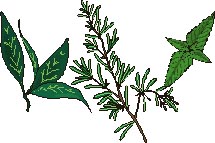We have used herbs in our everyday lives, in medicine and in cookery, since time immemorial.
Herbs have been nature's pharmacy for thousands of year and a renewed interest in all forms of alternative medicine has led consumers, health care providers, and drug researchers to re-examine herbal remedies.
This guide to herbs and their uses has been designed to allow everyone access to the age old lore of herbs, their history, their cultivation and their many uses. It includes the full text of Culpeper's Complete Herbal from 1814, which, believe it or not, was rescued by my mother from a bonfire, a little the worse for wear, but still legible.
A word of caution though: Whilst many herbs are used for their flavour and medicinal properties, like drugs, any plant with the potential for healing when used appropriately also has the potential for harm when used irresponsibly. Whilst the most popular medicinal herbs are reasonably safe for most people, most of the time, and when taken in their recommended amounts, many medicinal herbs contain pharmacologically active compounds that have drug effects on the body. All drugs have the potential to cause allergic reactions, side effects, and interactions with other herbs and drugs. Anyone who uses herbs should do so cautiously, responsibly and be well informed on the herb they choose.

